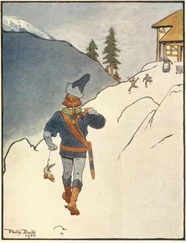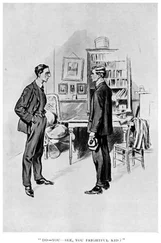Pelham Wodehouse - A Prefect's Uncle
Здесь есть возможность читать онлайн «Pelham Wodehouse - A Prefect's Uncle» весь текст электронной книги совершенно бесплатно (целиком полную версию без сокращений). В некоторых случаях можно слушать аудио, скачать через торрент в формате fb2 и присутствует краткое содержание. Жанр: Классическая проза, на английском языке. Описание произведения, (предисловие) а так же отзывы посетителей доступны на портале библиотеки ЛибКат.
- Название:A Prefect's Uncle
- Автор:
- Жанр:
- Год:неизвестен
- ISBN:нет данных
- Рейтинг книги:4 / 5. Голосов: 1
-
Избранное:Добавить в избранное
- Отзывы:
-
Ваша оценка:
- 80
- 1
- 2
- 3
- 4
- 5
A Prefect's Uncle: краткое содержание, описание и аннотация
Предлагаем к чтению аннотацию, описание, краткое содержание или предисловие (зависит от того, что написал сам автор книги «A Prefect's Uncle»). Если вы не нашли необходимую информацию о книге — напишите в комментариях, мы постараемся отыскать её.
A Prefect's Uncle — читать онлайн бесплатно полную книгу (весь текст) целиком
Ниже представлен текст книги, разбитый по страницам. Система сохранения места последней прочитанной страницы, позволяет с удобством читать онлайн бесплатно книгу «A Prefect's Uncle», без необходимости каждый раз заново искать на чём Вы остановились. Поставьте закладку, и сможете в любой момент перейти на страницу, на которой закончили чтение.
Интервал:
Закладка:
'See that kid?' said Danvers. 'That's the chap I was telling you about. Gethryn's uncle, you know.'
'Not really? Let's cultivate him. I say, old chap, don't walk so fast.' Farnie, rightly concluding that the remark was addressed to him, turned and waited, and the three strolled over to the School buildings together.
They would have made an interesting study for the observer of human nature, the two seniors fancying that they had to deal with a small boy just arrived at his first school, and in the grip of that strange, lost feeling which attacks the best of new boys for a day or so after their arrival; and Farnie, on the other hand, watching every move, as perfectly composed and at home as a youth should be with the experience of three public schools to back him up.
When they arrived at the School gates, Monk and Danvers turned to go in the direction of their form-room, the Remove, leaving Farnie at the door of the Upper Fourth. At this point a small comedy took place. Monk, after feeling hastily in his pockets, requested Danvers to lend him five shillings until next Saturday. Danvers knew this request of old, and he knew the answer that was expected of him. By replying that he was sorry, but he had not got the money, he gave Farnie, who was still standing at the door, his cue to offer to supply the deficiency. Most new boys—they had grasped this fact from experience—would have felt it an honour to oblige a senior with a small loan. As Farnie made no signs of doing what was expected of him, Monk was obliged to resort to the somewhat cruder course of applying for the loan in person. He applied. Farnie with the utmost willingness brought to light a handful of money, mostly gold. Monk's eye gleamed approval, and he stretched forth an itching palm. Danvers began to think that it would be rash to let a chance like this slip. Ordinarily the tacit agreement between the pair was that only one should borrow at a time, lest confidence should be destroyed in the victim. But here was surely an exception, a special case. With a young gentleman so obviously a man of coin as Farnie, the rule might well be broken for once.
'While you're about it, Farnie, old man,' he said carelessly, 'you might let me have a bob or two if you don't mind. Five bob'll see me through to Saturday all right.'
'Do you mean tomorrow?' enquired Farnie, looking up from his heap of gold.
'No, Saturday week. Let you have it back by then at the latest. Make a point of it.'
'How would a quid do?'
'Ripping,' said Danvers ecstatically.
'Same here,' assented Monk.
'Then that's all right,' said Farnie briskly; 'I thought perhaps you mightn't have had enough. You've got a quid, I know, Monk, because I saw you haul one out at breakfast. And Danvers has got one too, because he offered to toss you for it in the study afterwards. And besides, I couldn't lend you anything in any case, because I've only got about fourteen quid myself.'
With which parting shot he retired, wrapped in gentle thought, into his form-room; and from the noise which ensued immediately upon his arrival, the shrewd listener would have deduced, quite correctly, that he had organized and taken the leading part in a general rag.
Monk and Danvers proceeded upon their way.
'You got rather left there, old chap,' said Monk at length.
'I like that,' replied the outraged Danvers. 'How about you, then? It seemed to me you got rather left, too.'
Monk compromised.
'Well, anyhow,' he said, 'we shan't get much out of that kid.'
'Little beast,' said Danvers complainingly. And they went on into their form-room in silence.
'I saw your young—er—relative in earnest conversation with friend Monk this morning,' said Marriott, later on in the day, to Gethryn; 'I thought you were going to give him the tip in that direction?'
'So I did,' said the Bishop wearily; 'but I can't always be looking after the little brute. He only does it out of sheer cussedness, because I've told him not to. It stands to reason that he can't like Monk.'
'You remind me of the psalmist and the wicked man, surname unknown,' said Marriott. 'You can't see the good side of Monk.'
'There isn't one.'
'No. He's only got two sides, a bad side and a worse side, which he sticks on on the strength of being fairly good at games. I wonder if he's going to get his First this season. He's not a bad bat.'
'I don't think he will. He is a good bat, but there are heaps better in the place. I say, I think I shall give young Farnie the tip once more, and let him take it or leave it. What do you think?'
'He'll leave it,' said Marriott, with conviction.
Nor was he mistaken. Farnie listened with enthusiasm to his nephew's second excursus on the Monk topic, and, though he said nothing, was apparently convinced. On the following afternoon Monk, Danvers, Waterford, and he hired a boat and went up the river together. Gethryn and Marriott, steered by Wilson, who was rapidly developing into a useful coxswain, got an excellent view of them moored under the shade of a willow, drinking ginger-beer, and apparently on the best of terms with one another and the world in general. In a brief but moving speech the Bishop finally excommunicated his erring relative. 'For all I care,' he concluded, 'he can do what he likes in future. I shan't stop him.'
'No,' said Marriott, 'I don't think you will.'
For the first month of his school life Farnie behaved, except in his choice of companions, much like an ordinary junior. He played cricket moderately well, did his share of compulsory fielding at the First Eleven net, and went for frequent river excursions with Monk, Danvers, and the rest of the Mob.
At first the other juniors of the House were inclined to resent this extending of the right hand of fellowship to owners of studies and Second Eleven men, and attempted to make Farnie see the sin and folly of his ways. But Nature had endowed that youth with a fund of vitriolic repartee. When Millett, one of Leicester's juniors, evolved some laborious sarcasm on the subject of Farnie's swell friends, Farnie, in a series of three remarks, reduced him, figuratively speaking, to a small and palpitating spot of grease. After that his actions came in for no further, or at any rate no outspoken comment.
Given sixpence a week and no more, Farnie might have survived an entire term without breaking any serious School rule. But when, after buying a bicycle from Smith of Markham's, he found himself with eight pounds to his name in solid cash, and the means of getting far enough away from the neighbourhood of the School to be able to spend it much as he liked, he began to do strange and risky things in his spare time.
The great obstacle to illicit enjoyment at Beckford was the four o'clock roll-call on half-holidays. There were other obstacles, such as half-holiday games and so forth, but these could be avoided by the exercise of a little judgement. The penalty for non-appearance at a half-holiday game was a fine of sixpence. Constant absence was likely in time to lead to a more or less thrilling interview with the captain of cricket, but a very occasional attendance was enough to stave off this disaster; and as for the sixpence, to a man of means like Farnie it was a mere nothing. It was a bad system, and it was a wonder, under the circumstances, how Beckford produced the elevens it did. But it was the system, and Farnie availed himself of it to the full.
The obstacle of roll-call he managed also to surmount. Some reckless and penniless friend was generally willing, for a consideration, to answer his name for him. And so most Saturday afternoons would find Farnie leaving behind him the flannelled fools at their various wickets, and speeding out into the country on his bicycle in the direction of the village of Biddlehampton, where mine host of the 'Cow and Cornflower', in addition to other refreshment for man and beast, advertised that ping-pong and billiards might be played on the premises. It was not the former of these games that attracted Farnie. He was no pinger. Nor was he a pongster. But for billiards he had a decided taste, a genuine taste, not the pumped-up affectation sometimes displayed by boys of his age. Considering his age he was a remarkable player. Later on in life it appeared likely that he would have the choice of three professions open to him, namely, professional billiard player, billiard marker, and billiard sharp. At each of the three he showed distinct promise. He was not 'lured to the green cloth' by Monk or Danvers. Indeed, if there had been any luring to be done, it is probable that he would have done it, and not they. Neither Monk nor Danvers was in his confidence in the matter. Billiards is not a cheap amusement. By the end of his sixth week Farnie was reduced to a single pound, a sum which, for one of his tastes, was practically poverty. And just at the moment when he was least able to bear up against it, Fate dealt him one of its nastiest blows. He was playing a fifty up against a friendly but unskilful farmer at the 'Cow and Cornflower'. 'Better look out,' he said, as his opponent effected a somewhat rustic stroke, 'you'll be cutting the cloth in a second.' The farmer grunted, missed by inches, and retired, leaving the red ball in the jaws of the pocket, and Farnie with three to make to win.
Читать дальшеИнтервал:
Закладка:
Похожие книги на «A Prefect's Uncle»
Представляем Вашему вниманию похожие книги на «A Prefect's Uncle» списком для выбора. Мы отобрали схожую по названию и смыслу литературу в надежде предоставить читателям больше вариантов отыскать новые, интересные, ещё непрочитанные произведения.
Обсуждение, отзывы о книге «A Prefect's Uncle» и просто собственные мнения читателей. Оставьте ваши комментарии, напишите, что Вы думаете о произведении, его смысле или главных героях. Укажите что конкретно понравилось, а что нет, и почему Вы так считаете.


